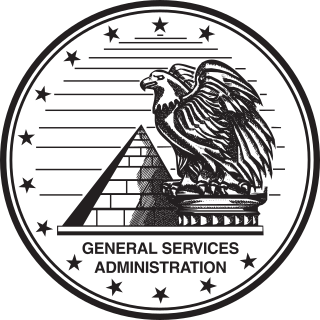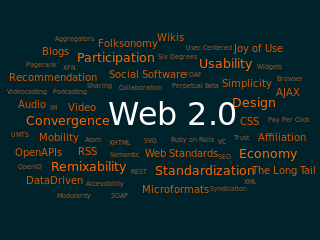Spamdexing is the deliberate manipulation of search engine indexes. It involves a number of methods, such as link building and repeating unrelated phrases, to manipulate the relevance or prominence of resources indexed in a manner inconsistent with the purpose of the indexing system.
A web portal is a specially designed website that brings information from diverse sources, like emails, online forums and search engines, together in a uniform way. Usually, each information source gets its dedicated area on the page for displaying information ; often, the user can configure which ones to display. Variants of portals include mashups and intranet dashboards for executives and managers. The extent to which content is displayed in a "uniform way" may depend on the intended user and the intended purpose, as well as the diversity of the content. Very often design emphasis is on a certain "metaphor" for configuring and customizing the presentation of the content and the chosen implementation framework or code libraries. In addition, the role of the user in an organization may determine which content can be added to the portal or deleted from the portal configuration.

The National Technical Information Service (NTIS) is an agency within the U.S. Department of Commerce. The primary mission of NTIS is to collect and organize scientific, technical, engineering, and business information generated by U.S. government-sponsored research and development, for private industry, government, academia, and the public. The systems, equipment, financial structure, and specialized staff skills that NTIS maintains to undertake its primary mission allow it to provide assistance to other agencies requiring such specialized resources.
In cryptography, a public key certificate, also known as a digital certificate or identity certificate, is an electronic document used to prove the validity of a public key. The certificate includes information about the key, information about the identity of its owner, and the digital signature of an entity that has verified the certificate's contents. If the signature is valid, and the software examining the certificate trusts the issuer, then it can use that key to communicate securely with the certificate's subject. In email encryption, code signing, and e-signature systems, a certificate's subject is typically a person or organization. However, in Transport Layer Security (TLS) a certificate's subject is typically a computer or other device, though TLS certificates may identify organizations or individuals in addition to their core role in identifying devices. TLS, sometimes called by its older name Secure Sockets Layer (SSL), is notable for being a part of HTTPS, a protocol for securely browsing the web.

The General Services Administration (GSA) is an independent agency of the United States government established in 1949 to help manage and support the basic functioning of federal agencies. GSA supplies products and communications for U.S. government offices, provides transportation and office space to federal employees, and develops government-wide cost-minimizing policies and other management tasks.
URL redirection, also called URL forwarding, is a World Wide Web technique for making a web page available under more than one URL address. When a web browser attempts to open a URL that has been redirected, a page with a different URL is opened. Similarly, domain redirection or domain forwarding is when all pages in a URL domain are redirected to a different domain, as when wikipedia.com and wikipedia.net are automatically redirected to wikipedia.org.
MedlinePlus is an online information service produced by the United States National Library of Medicine. The service provides curated consumer health information in English and Spanish with select content in additional languages. The site brings together information from the National Library of Medicine (NLM), the National Institutes of Health (NIH), other U.S. government agencies, and health-related organizations. There is also a site optimized for display on mobile devices, in both English and Spanish. In 2015, about 400 million people from around the world used MedlinePlus. The service is funded by the NLM and is free to users.
Internet privacy involves the right or mandate of personal privacy concerning the storage, re-purposing, provision to third parties, and display of information pertaining to oneself via the Internet. Internet privacy is a subset of data privacy. Privacy concerns have been articulated from the beginnings of large-scale computer sharing and especially relate to mass surveillance enabled by the emergence of computer technologies.
The United States National Agricultural Library (NAL) is one of the world's largest agricultural research libraries, and serves as a national library of the United States and as the library of the United States Department of Agriculture. Located in Beltsville, Maryland, it is one of five national libraries of the United States. It is also the coordinator for the Agriculture Network Information Center (AgNIC), a national network of state land-grant institutions and coordinator for the U.S. Department of Agriculture (USDA) field libraries.

Web 2.0 refers to websites that emphasize user-generated content, ease of use, participatory culture and interoperability for end users.

Directgov was the British government's digital service for people in the United Kingdom, which from 2004 provided a single point of access to public sector information and services. The site's portal was replaced by the new GOV.UK website on 17 October 2012, although migration of all services to GOV.UK branding took several years.
Citysearch is an online city guide that provides information about businesses in the categories of dining, entertainment, retail, travel, and professional services in cities throughout the United States. Visitors to each of Citysearch's local city guides will find contact information, maps, driving directions, editorial, and user reviews for the businesses listed. Citysearch is headquartered in West Hollywood, California and is an owned and operated web site of CityGrid Media, which is an operating business of eLocal. The original office was in Pasadena, California.
In online marketing, a landing page, sometimes known as a "lead capture page", "single property page", "static page", "squeeze page" or a "destination page", is a single web page that appears in response to clicking on a search engine optimized search result, marketing promotion, marketing email or an online advertisement. The landing page will usually display directed sales copy that is a logical extension of the advertisement, search result or link. Landing pages are used for lead generation. The actions that a visitor takes on a landing page is what determines an advertiser's conversion rate. A landing page may be part of a microsite or a single page within an organization's main web site.
URL shortening is a technique on the World Wide Web in which a Uniform Resource Locator (URL) may be made substantially shorter and still direct to the required page. This is achieved by using a redirect which links to the web page that has a long URL. For example, the URL "https://example.com/assets/category_B/subcategory_C/Foo/" can be shortened to "https://example.com/Foo", and the URL "https://en.wikipedia.org/wiki/URL_shortening" can be shortened to "https://w.wiki/U". Often the redirect domain name is shorter than the original one. A friendly URL may be desired for messaging technologies that limit the number of characters in a message, for reducing the amount of typing required if the reader is copying a URL from a print source, for making it easier for a person to remember, or for the intention of a permalink. In November 2009, the shortened links of the URL shortening service Bitly were accessed 2.1 billion times.
Picasa Web Albums (PWA) was an image hosting and sharing web service from Google, often compared to Flickr and similar sites. The service links with Google's photo organizing desktop program Picasa. It was discontinued in May 2016 and succeeded by Google Photos which does not support sharing photo albums on the public world wide web.
HIV.gov, formerly known as AIDS.gov, is an internet portal for all United States federal domestic HIV and AIDS resources and information. On World AIDS Day, December 1, 2006, the U.S. Department of Health and Human Services launched AIDS.gov. The site contains content and links that guide users to their desired information.
USAGov en Español is the official portal of the United States Government in Spanish. It is the sister site of USA.gov, the official portal of the U.S. Government in English.

GovTrack.us is a website developed by then-student Joshua Tauberer. It is based in Washington, D.C., and was launched as a hobby. It enables its users to track the bills and members of the United States Congress. Users can add trackers to certain bills, thereby narrowing the scope of the information they receive. The website collects data on members of Congress, allowing users to check members' voting records and attendance relative to their peers. It propagates the ideology of increasing transparency in the government and building better communication between the general public and the government. The website was briefly "on pause" in September 2020 in protest of then-President Donald Trump's refusal to commit to a peaceful transition of power regarding the 2020 U.S. Presidential Election.
Science.gov is a web portal and specialized search engine. Using federated search technology, Science.gov serves as a gateway to United States government scientific and technical information and research. Currently in its fifth generation, Science.gov provides a search of over 60 databases from 14 federal science agencies and 200 million pages of science information with just one query, and is a gateway to 2,200+ scientific websites.
The Federal Web Managers Council is an interagency group of senior federal government Web managers and new media directors who work together to improve the delivery of United States government information and services online. Established in 2004, its current mission is to provide opportunities for collaboration among U.S. government Web and new media professionals. It also recommends policies and guidelines for all U.S. federal public websites.




